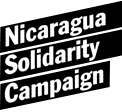Solidarity, Projects
Information on current and recent projects is shown below. If you would like to get involved in one of our existing projects, or have ideas for new projects, please get in touch with Louise Richards by emailing her at nscag@nicaraguasc.org.uk
Project Reports
TUC Aid supports project for women trade unionists in Nicaragua
The self-employed workers’ union CTCP, based in Managua, Nicaragua, has worked with TUC Aid to recruit and support more woman members while reforming its structure to ensure that women can take senior roles in its previously male-dominated federations and regional branches.
The self-employed workers of the streets of Managua – mototaxi drivers, shoe repairers, street food vendors, barbers, tailors, mobile phone sellers, porters, money changers and many more – face different challenges to those employed in a country with the best workers’ rights in the region. The 90,000 people ply their trade in historically difficult circumstances. Until recently they were working in the face of laws that forbade street selling, with the police and city authorities finding ways to make their lives impossible.
Even now they are excluded from social protection, working long hours for money that falls well short of an equivalent living wage. With the majority of the women traders also single mothers, this creates enormous difficulties for the business, for the future of their children and for their potential participation in the union.
Realising that the issues faced by these women needed to be addressed by the union, CTCP’s approach was not to worry about doing things on their behalf, but to make sure that the union could properly represent them. That meant ensuring that the union had more woman members, and equal representation for women at each level of the union.
Background
The Confederation of Self-Employed Workers (CTCP), an affiliate of the FNT (an ITUC member confederation) represents Nicaragua’s independent workers providing services from Managua’s streets, including food and drink, repairs and transport, as well as mobile labour such as electricians and plumbers, as well as more traditional, formal workers.
The street-based sector, criminalised under pre-2006 governments, has organised itself with the help of the FNT and slowly build an effective and growing union able to represent these micro-enterprises and help them collaborate to overcome the challenges they face. The union reports that there were over 90,000 such workers on the streets of the capital, facing much harsher working hours than the country’s average and still struggling to make a living wage.
At the start of the project CTCP had 60,000 members, of whom only 48% were women, despite their dominance of the sector. More positively, 65% of the CTCP membership were younger workers under 36.
The service sector produces around half of Nicaragua’s GDP, but the self-employed workers in it work longer hours and have less access to social security. Street based workers include food vendors, mechanics, tailors, barbers, rickshaw drivers, and mobile-phone sellers. The previous law banning street work left such workers vulnerable to crime and sexual harassment, though the gradual mainstreaming of their economic role and the role of CTCP in representing them has helped reduce these problems significantly.
In Nicaragua 41% of men work as “owners of enterprises without employees,” with 55.7% of women working with the same absence of proper employment protection.
The sector workers much longer hours than the country’s average, leaving workers little time for union activity. The prevalence of women, and the majority of them single mothers, further reduces the opportunities for engagement and activity. This leads to a predominantly female sector having a male-majority union run by male-dominated branches. To their credit, the CTCP national executive – already much better gender-balanced - recognised the unsustainability of such a set up and worked up a plan to reverse it.
Facts about workers in urban Nicaragua
50% services, including the workers of CTCP
Healthy wage growth from a low base
Solid GDP growth, again from low base: second lowest GDP per capita in the Americas after Haiti
Second highest adolescent fertility rate in CA, down from 1st pre-Sandanista. This inevitably means that a large number of the workers start their careers with children, who frequently end up working alongside them – 47% of Nicaragua’s children between 7-14 are in employment.
Background information about workers’ rights in Nicaragua
As shown by the ITUC’s survey of rights, Nicaragua may have problems but, compared to its neighbours, the backdrop is relatively positive. Apart from some limitations on the length of the strike action, the country’s workers’ rights legislation is sound, though as with many countries in Latin America the quality of enforcement does not yet match the laws.
However, the workers plying their various trades on the streets of Managua have suffered from a different set of problems, defined not by their status as employees (most are not), but with struggles against the city administration and – up until a change in the law finally legitimised street selling - attempts by the police to clear them from the streets. The attitude of the authorities also left the workers vulnerable to exploitation and criminal activity.
Widening recruitment and representation in the union has helped manage some of these issues, with collective action crucial in forcing the local government and law enforcement to change their attitude and regulations.
The project proposal
The CTCP, its members facing hostility from authorities and exclusion from social policy, education and poverty reduction programmes, recognised that it needed to recruit more workers and better represent them within its structures.
A request from the CTCP Women’s Committee fitted perfectly into the union’s growing agenda of developing internal solutions to external problems. By assessing the needs of members, activists and officers, the union could position itself as a more effective negotiating force as well as improving the lives of thousands of workers.
The Women’s Committee request was that the union look seriously into overhauling radically representation of women at a senior level and beginning a programme of recruitment and advancement that would see more women not only joining the union but also participating in its work and – ultimately – taking senior positions in much greater numbers. To achieve this, a training programme, with subjects ranging from those to help women free up their time from work and domestic duties to participate, to training for potential union leaders, would be developed and implemented. Men in the male dominated regional branches and committees were slowly persuaded that the benefits to the union of an influx of new members and the identification and training of a new wave of leaders would strengthen and refresh CTCP rather than threaten their positions. Fostering mutual respect became a core part of the strategy.
The CTCP executive, which unlike its regions and federations already had a gender balance, undertook to set up a parallel programme of structural reform to ensure that women recruited and trained had the necessary opportunities to participate in union work. As a first step they agreed to expand their existing patchy network of women’s committees to cover more regions and localities, creating and resourcing 11 new committees in areas where they were absent, with the potential for over 100 new women activists to become involved in the union.
On the ground, CTCP knew the project would fail unless it address the barriers to participation for ordinary women involved in the various trades represented by the union. Amongst those problems, the sheer time burden of running a business combined – frequently – with single motherhood or other caring responsibilities meant even the idea of attending a union meeting, let alone standing of office or volunteering as an activist. By giving access to even basic training – many of the workers having had no education around how to run their businesses – it was hoped that at least some of the women would spend a degree of any time saved to give something back to the union that had helped them through participation and activism.
Of course, the same barriers that prevented women engaging in the union would also interfere with their ability to undertaking courses, so the union used its existing network of members to provide collective crèche coverage at each of the courses.
On the Street
The effect of the greater representation of women has been felt swiftly on the streets of the capital. The women leaders have quickly gained a reputation of ambitious and fearless negotiators, as shown by their pursuit of an agreement that the Managua authorities provide kiosks for all their members that needed them. This state provision of shelter represents a profound turnaround in the attitude of the authorities, who have now granted semi-permanence to workers they had previously been trying to drive off the streets altogether.
This new cooperation was also valuable when a construction project threatened the livelihoods of 200 CTCP members. Instead of the authorities using this as an excuse to drive the 200 out of business, as would have once been the case, the union has secured new pitches for them in other parts of Managua.
The union also took the opportunity to address one of the most serious by-products of their members’ business models. With almost half of all children aged 7-14 engaged in some sort of employment in Nicaragua, it was natural for the children, particularly those who had been accompanying their mothers to work since they were babies, to start helping out, with little stigma attached.
Through the project, the union has worked to raise the issue with its members, encouraging them to send the children to school and working with their contacts in government to facilitate this and deal with any serious problems. CTCP report that child labour in their sector has already dropped, and they are working on plans to reduce it still further.
Women’s Networks
Early in the project, CTCP’s National Women’s Committee half a National Assembly to agree a project work plan and agree their key objectives. Throughout the project, the met every fortnight to carry out their oversight of the project, ensuring that the goal of increasing membership and representation of women in the union was met and that the training packages recognised the priorities of women members.
The new committees were founded around women already active at branch level, but gave them a chance to formalise their involvement and become more visible to other members and to the authorities with which the union negotiates. These authorities were initially reluctant to speak to women but, according to CTCP, have increasingly learned to respect the new officers.
As part of the project not only did the National Committee visit and support the new women’s networks, but they increased their engagement and support for existing women’s committees, giving woman from around the regions more of an opportunity to engage at a national level.
Leadership & Membership
Such was the impact of the project that there has been a fundamental shift in the make-up of the union’s sectoral leadership. At the start of the project only one of CTCP’s nine sectoral federations was led by a woman. Today, that has almost been reversed, with only two now led by a man.
The union’s membership was 60,000 and at the start of the project and has grown rapidly. As the report of the UNISON delegation at the end of the last year stated, not long after the project’s formal end:
“One of the fastest growing FNT federations is the CTCP, the Self-Employed Workers Centre which has 85,000 members, covers 9 sectors and has 5 regional organisations.”
Next steps
Although the project has already had a powerful effect on the union’s structures and its external relationships, it was always intended as a pilot and pump-priming activity and CTCP will continue to use the learning materials to benefit women members and to support and encourage new women leaders, with those already trained being asked to promote the courses to colleagues or to pass on key skills themselves. CTCP are particularly keen to build on the project’s transformative effect on the lives of members and their families, for instance by continuing the work to reduce the prevalence of child labour
UNE Trade Union Training School
UNISON's International Development Fund is supporting a two year project for the public sector union UNE. The project will establish a trade union training school which will train 50 trade union leaders over the two years. The aim of the porject is to strengthen the union by providing capacity building for UNE's leaders at all levels. The training will provide in-depth courses on economic, social and labour laws and will cover everything from the basic principles of trade unionism to macro and micro economics and specialist trade union qualifications.
UNE hopes that with better trained leaders, they will be able to negotiate better deals for their members in terms of improved salaries, better collective agreements and better working conditions in terms of health and safety. A spin off from this is likely to be that more workers will be encouraged to join the union.
UNE has already taken the first steps in terms of renting and equipping new premises and employing staff to provide the training. The first training module took place on 29th July 2015.
The project will be carried out under the direction of the National Executive Committee of UNE; UNE's Trade Union Education Secretary will have day to day operational responsibility for the project. It is expected that by the end of the two years, the school will be fully functional. UNE believes that the project will strengthen their union and they hope to expand its activities still further at the end of the two year period.
FETSALUD Capacity Building Project
In partnership with UNISON's West Midlands Region, UNISON International is also supporting a capacity building project for the health trade union FETSALUD. The project is specifically designed to build the knowledge and capacity of women and young members in the union. Women currently make up at least half of the union's membership.
The project proposes the development of a series of courses divided into three modules - introductory, basic and specialised. The courses will be developed with the assistance of IHFOCATT, an institute established by the Nicaraguan trade union movement which has wide expertise in the education and capacity building of workers.
Each of the courses will have the following general objectives:-
- to facilitate the exchange of experiences by trade union colleagues from different parts of the country and different social environments
- to provide participants with the information they need for efficient performance of their duties
- to build a consensus on the interpretation and application of the various topics being studied
- to provide tools of analysis from various disciplines which contribuite to a holistic and scientific education of each participant, wiht a special emphasis on perspectives of gender and youth
The courses are designed in a modular way so that they are accessible to those who have commitments at work, in the family and in their unions. The aim is to ensure that by the end of their training, participants will have the technical skills and abilities which will enable them to fully exercise their role as representatives of their members. A research project will be carried out at the end of every course in order to evaluate how participants are applying what they have learnt to their everyday trade union work.
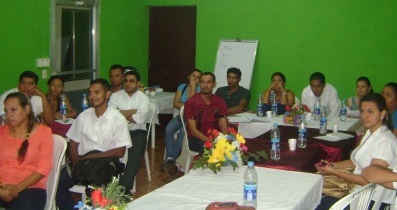
FETSALUD believes that this project will improve the effectiveness of trade union work and empower women and young people as leaders and future leaders. In addition to specific trade union training, the courses will contribute to a better understanding of national and international problems, based on the understanding that working people in Nicaragua are part of a regional and global market.
Building Capacity for Self Employed Women
The British TUC, through its TUC Aid programme, has agreed to support a project to promote women's leadership and participation in the self-employed workers union CTCP. The project began in May 2015 and will run for 18 months. It aims to empower self-employed women ad enhance their ability to solve the economic and social problems they face while building strong and proactive women's leadership able to participate fully in the work of the union and advocate improvements in society and better working conditions.
One of the main challenges faced by self-employed women is the fact that most of them work a 12 hour day and the majority of them are also single mothers with the double burden of child care responsibilities and domestic chores. Despite efforts by threunion to affect government policy, most self-employed workers do not have access to social security and their earnings are not enough to meet their basic subsistence needs. This leaves little time for union activism. Although over half of the current membership of the CTCP's National Executive Committee are women, this is not reflected at district and municipal level, where participation levels are around 25-30%. It is hoped that the project will change this.
The project is designed to recruit an additional 4000 women members to the union and at the same time to result in a demonstrable increase in the number of women who put themselves forward for leadership positions.
The activities to be undertaken as part of the project will include:-
- a recruitment drive aimed at women
- personal development sessions
- organising an Enterprise Fair where women can present their new skills and display their products
The CTCP will also scope and develop work-related training for self-employed women. Women members of the CTCP already have a good deal of practical experience, but they lack the up-to-date technical knowledge they need to improve their working methods and tools in such a way that they can further their careers and increase productivity and earning potential. This union-led training will be designed to help women directly, but also to address this issue: if women are able to earn more, they will be able to work shorter hours and have more time available for activism and engagement.
It is expected that the project will have a 'cascading' effect and that women members who have undergone the training will be able to share their knowledge and skills with other women, particularly younger women.
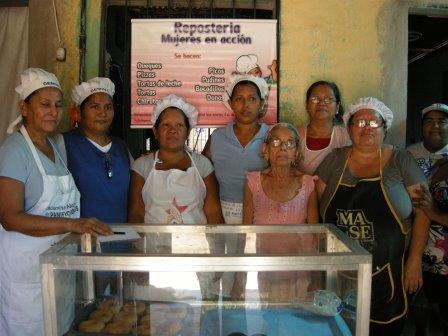
Self-employed workers in Nicaragua represent a vulnerable sector in society and one that has suffered discrimination and that has been excluded for a long time from social policy, education and poverty reduction actions. Through projects such as this, the CTCPaims to increase its level of organisation, consolidate its union structures and integrate men and women within thenm. In this way, they hope to achieve significant changes in relationships of gender equality and equity that will enable them to implement changes that will improve and enhance social and economic justice.
Developing Computer Skills
The Nicaragua Solidarity Campaign Action Group has joined forces with Computer Aid International in a project to provide computers to the National Workers' Front, FNT. The project is supported by the National Union of Teachers, NUT, and the UIA Charitable Fund. It will allow the FNT to establish and maintain a computer laboratory in their training centre. The facility will be available to all of the FNT's affiliated unions. Training will be carried out by teachers in the FNT's training arm, IHFOCATT, which focuses in particular on poor and vulnerable communities.
The project is specifically designed to ensure that trade union members have the Information and Technology (ICT) skills they need to enable them to improve their access to employment, increase their income and enhance their effectiveness as trade unionists. Unemployment in Nicaragua is high at around 800,000 out of an economically active population of 3.2 million and wages are low, with only 10% of the population earning more than US$10000 per annum.
The project is taking place over three years. In year one, the FNT will establish and maintain the computer laboratory referred to above. In year two, ICT provision will be rolled out to FNT regional offices and the unions' leadership. This will develop organisational capacity and increase the ability of affiliated unions to represent marginalised and disadvantaged workers, particularly women and those with disabilities. In year three, the project will work with local union and community-based organisations to provide additional ICT capacity.
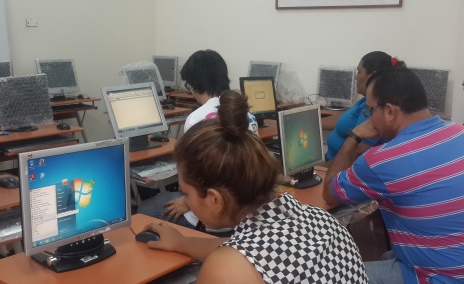
Further information about this project is available from Ludovic Gautier at Computer Aid International on ludovic@computeraid.org
Defending Workers' Rights
Prior to 2011, the public sector union UNE had only limited capacity to address attacks on workers' rights such as arbitrary sackings, denial of state benefits, sexual harassment and health and safety issues. Members, particularly low paid women workers with no recourses to pay legal fees, had no recourse to justice against rogue employers.
In 2011, thanks to support from UNISON's International Development Fund, UNE was able for the first time ever to set up a legal office not only to address members' problems but also to enable UNE to negotiate collective baragaining agreements more effectively and to provide training in employment law for union leaders. UNISON financed the first phase of the office from 2011-12 and subsequently approved funding for a further two years, from 2013-15. Funding for the project ended in June 2015, but UNE has taken steps to ensure that the office remains open for the foreseeable future.
Since its establishment, the legal office has achieved excellent results. It has obtained many legal rulings for job reinstatement and payment of employment benefits, as well as child maintenance rulings for workers and their families. It has benefitted women workers in particular, for example defending women sacked from their jobs for being pregnant. One of the most important results has been in terms of negotiating collective agreements, benefitting more than 550 workers at national level.
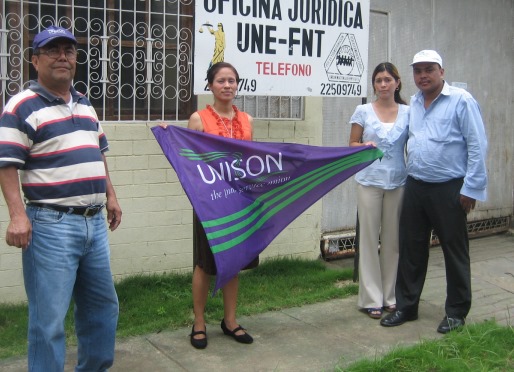
Another important achievement of the legal office has been the trade union training which is carried out by legal professionals for union leaders. Training has taken place on subjects which include:-
- Collective agreements
- Civil Service and Administrative Career Law
- Municipal Career Law and its regulation
- Gender Equity Law
- Budgetary System Law
- Trade Union Organisation
More recently, the Legal Office has provided invaluable training on the implementation of the new Labour and Social Security Protection Code which came into effect on 29th May 2013. A series of workshops has taken place around the country in order to inform and advise union leaders about the new Code. It is expected that the training carried out currently by the Legal Office will now be carried out as part of the remit of the newly established UNE Training School.
The services of the Legal Office and the training it provides have been made available to other unions within the FNT, not just UNE members.
The achievements of the Legal Office have been highly positive. It has enabled UNE and other trade union organisations to enhance their organising capacity and placed them in a better position to defend workers' interests. The Office has dealt with an average of 33 cases a month and has played a vital role in ensuring the defence of workers' rights throughout the country.





